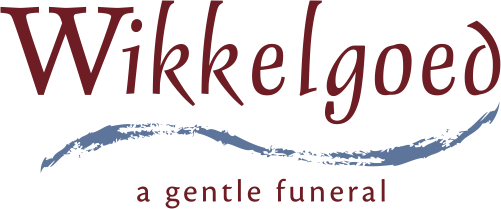No products in the cart.
Many of us are familiar with composting green waste to eventually use it to improve the soil of our vegetable gardens. But what does this process have to do with funerals? Well, in recent years, there has been increasing attention to human composting, also known as "veraarding" in Dutch. In Washington, this method has been allowed since 2019, and in Germany since 2022 at Meine-Erde. Many other European countries are currently conducting extensive research into the benefits of this sustainable funeral method. That's why we're already telling you everything about composting.
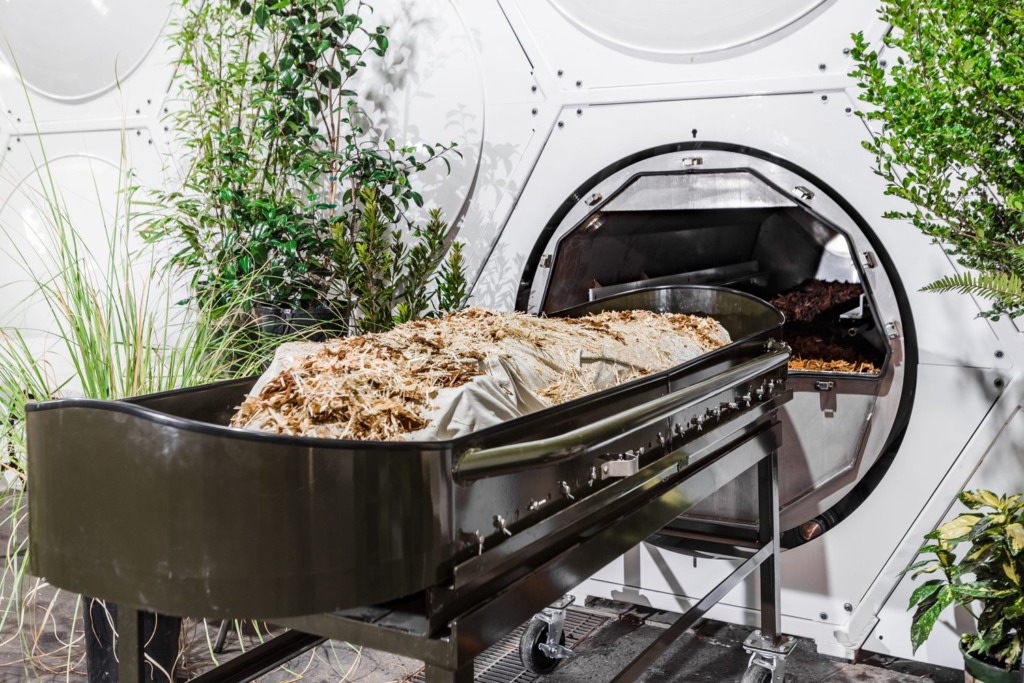
Returning to the Earth
Composting is a process in which the body of a deceased person is broken down into nutritious soil, compost, or humus without the use of chemicals or combustion. The body is placed in a special composting unit where the natural decomposition cycle is accelerated. In this way, the body is returned to the earth in a natural and efficient manner. This is the reason why the term 'veraarden' is increasingly used in the Netherlands.
How does composting work?
How does composting work exactly? In the composting unit, ideal conditions are created for microorganisms to break down the body. It's like a controlled environment where the climate is meticulously regulated. A perfect balance of moisture, oxygen, and temperature is established, providing an optimal living environment for microorganisms.
Composting, step by step.
Since composting is currently done on the largest scale in America, we will use the model of the American company Recompose in the explanation below.
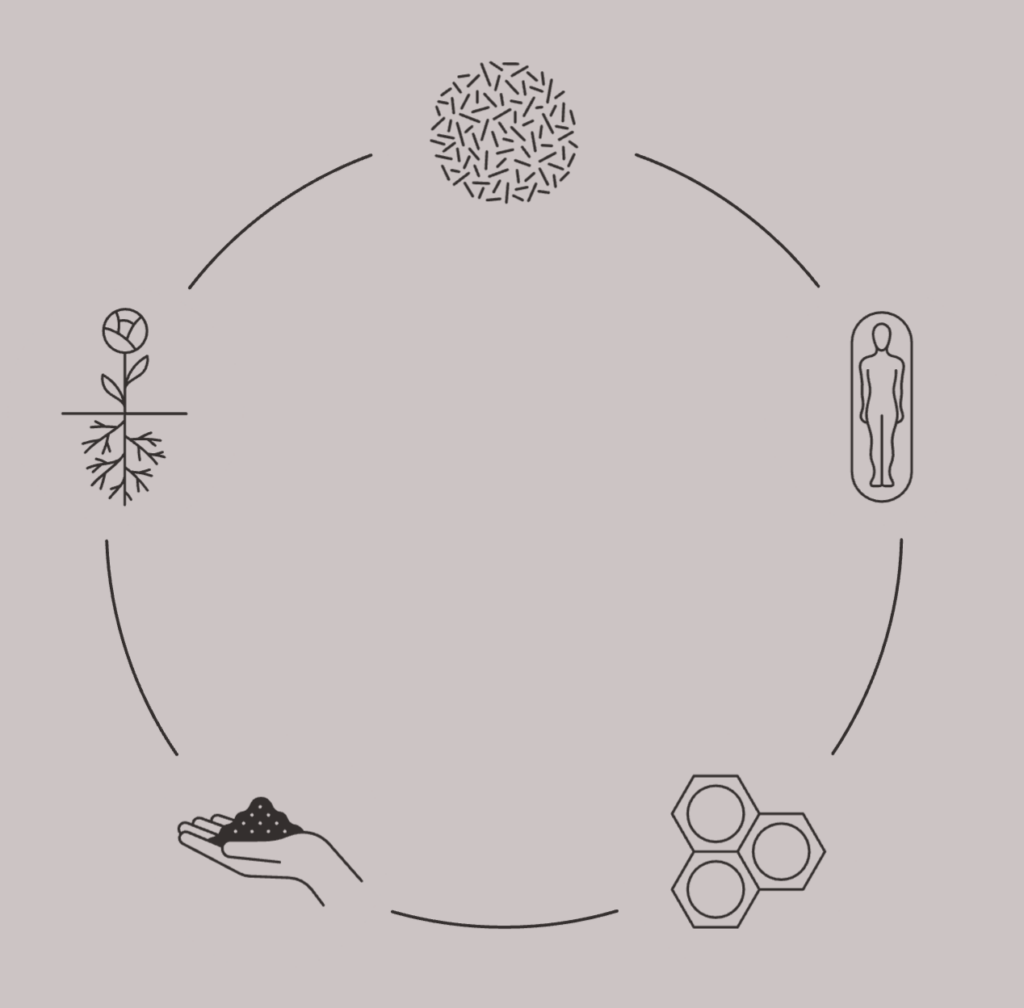
Placement
The body is placed in a 'cocoon,' a kind of capsule specially designed for human composting. Inside, the body is surrounded by wood chips, alfalfa, and straw. The amounts of this material are fully customized for each body. The capsule is sealed, and the transformation into soil begins.
Microbial breakdown
The duration of the process varies depending on the organization. Recompose estimates it to be five to seven weeks, whereas Meine Erde assumes 40 days. During this period, the body and plant materials remain in the capsule, and the body is slowly broken down by microorganisms. No chemicals or additives are used. The microorganisms generate temperatures up to 70°C. These temperatures destroy harmful pathogens and transform the body into fertile humus that is safe for humans and plants. The result of this breakdown process is nutrient-rich soil: compost.
Compost
Approximately one cubic yard (about 0.75 cubic meters) of usable compost is produced per body. This raw material is removed from the capsule and is allowed to aerate for an additional three to five weeks in the United States (this is not done in Germany, as it is legally required to bury this compost, where it naturally matures). After this process, it can be used to enrich the soil of forests, gardens, and all other forms of nature.
Life after Death
This nutritious resource essentially returns the nutrients from our bodies to nature. It can be used for reforestation, carbon sequestration, and nourishing new life. It is also possible to use the compost as nourishment for planting a tree in memory of the deceased.
Where can I undergo human composting at the moment?
If you want to be composted right now, you'll need to go abroad. Fortunately, you don't even have to go that far: in 2022, the German company Meine Erde became the first in Europe to start human composting, known as 'Reerdigung.' In the state of Washington in the United States, Recompose has been offering the possibility for composting since 2019.
Composting in the U.S.: Recompose
The Recompose Team:
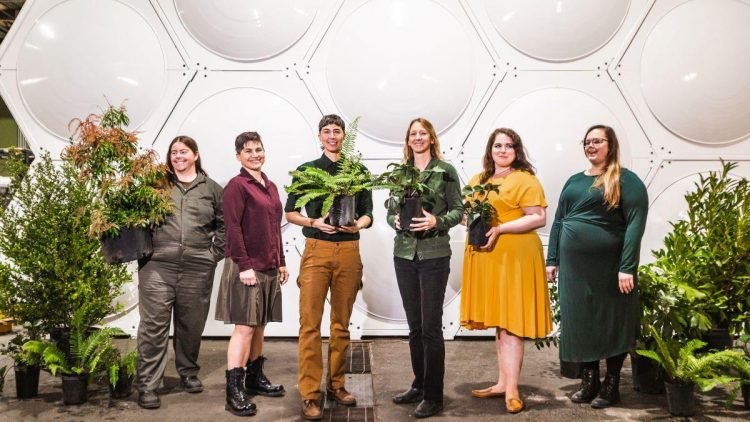
One day, while Founder Katrina Spade was playing in the backyard with her young son, she began to contemplate the idea that would later become Recompose. "It was during that time that it seemed like he was growing up so fast," she recalls. "One day he'll be 40, I thought. Oh wow... by then, I'll be over 70! That realization inspired me to think about my own mortality." A realization that seeped into her studies in Architecture at the University of Massachusetts.
It was at UMass where Katrina started pondering the environmental impact of traditional burial and cremation. "When I die, I'll probably be cremated," she thought. "I love natural burials, but I want to live in a city. Do I have to go back to the countryside to be buried? How can you bring nature to urban funerals?"
While she was at UMass, Katrina's childhood friend Kate Stephenson called her. "Did you know that farmers have been composting animals for decades?" The conversation got Katrina thinking: What if you could do that with people too? During her second year of school, Katrina, along with friends Garth and Jesse, built a compost heating system, demonstrating the incredible power of microbes. With her pioneering approach to funeral practices, Katrina eventually founded Recompose, a company dedicated to offering eco-friendly composting as an alternative to traditional burials and cremations.
To date, Recompose has composted nearly three hundred bodies, a success that has led to two other companies starting natural organic decomposition services: Return Home and the natural burial ground Herland Forest.
After the process, these three American entities offer the option to either collect the remaining fertile soil or donate it to a local forest. The choice does indeed vary: with Recompose, half opt for the forest, while with Return Home, only five percent donate. At Herland Forest natural burial ground, it is also possible to choose a natural grave, which more than 80 percent of people opt for.
Composting in Germany: Meine Erde
Meine Erde-oprichters Max Huesch en Pablo Metz:
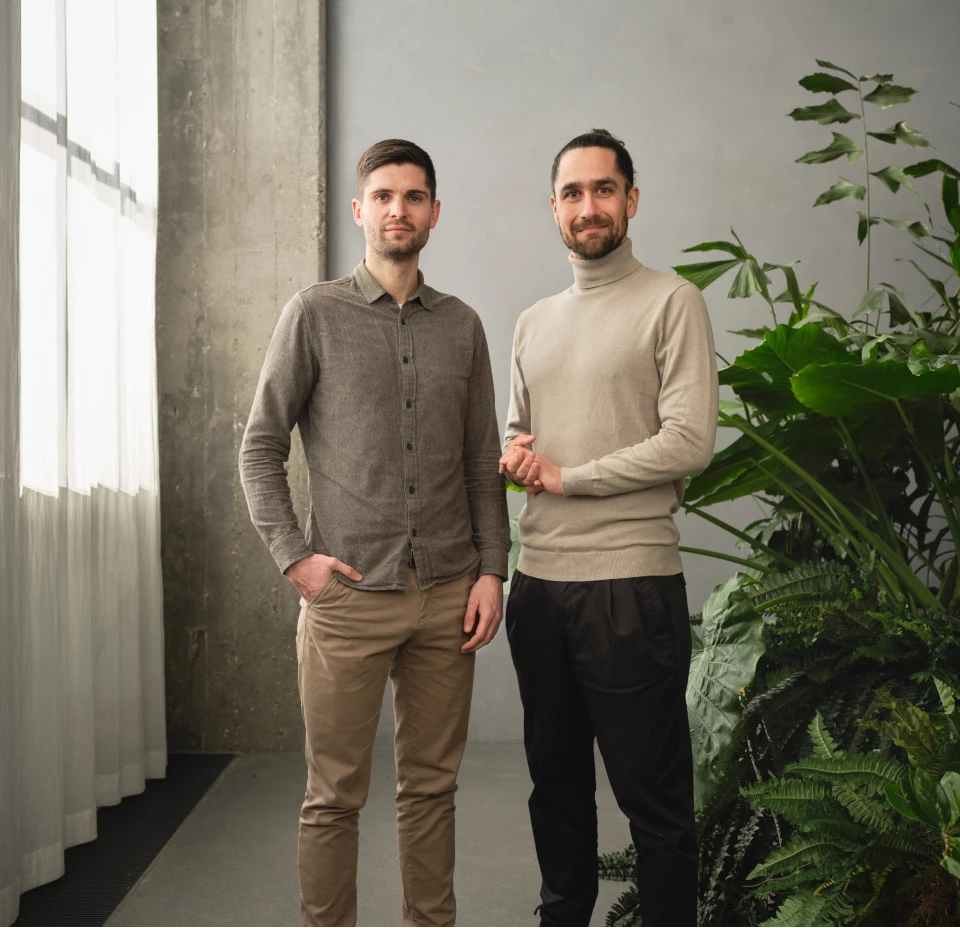
"While listening to the stories of our grandparents, we were impressed by their commitment to their legacy and their desire for a positive approach to farewell. We embarked on a search for a way of saying goodbye that honors the beautiful memories of the bereaved. The concept of not completely disappearing but rather giving birth to new life provides comfort and hope. The idea that a tree can grow from the earth of our loved ones, upon which future generations can climb and pick cherries, is a beautiful alternative for both those departing and those left behind. This is how the concept of Meine Erde came into being."
At the moment, Meine Erde, in collaboration with the University of Leipzig, is working on making Reerdigung (composting) accessible. The results of all the research they conduct are made public so that the process can be approved throughout Europe.
Composting in Belgium: Humification
In Belgium, there has been a growing movement for some time to enable composting, known as humusatie (humification) in Belgium. The Metamorfose Foundation, with over four hundred members by now, is currently exploring the possibilities of outdoor composting. This can be seen as a method closely resembling garden composting: a compost pile is created in a so-called metamorphosis garden. In this process, they utilize the microorganisms already present in the topsoil of our Earth, along with additional bacteria actively added to the pile. On their website, they state that they expect human remains to be transformed into healthy and fertile humus (the official term for the fertile top layer of soil) using this natural method within 12 months. Since March 23, 2023, they have been conducting tests with four pigs, research that they claim is nearing completion. With these results, they expect to receive permission for human trials soon.
Composting in the Netherlands
In the Netherlands, there is a growing interest in composting. The number of individuals and companies in the funeral industry working towards enabling composting in the Netherlands is rapidly increasing. Additionally, a foundation called Veraarden has been established, comprising a group of eight researchers, including GreenLeave chairman Evert de Niet, Immanuel Baan, Susanne Duijvestein, Marly van Lipzig, and Jurrien Roossien. They are dedicated to making this sustainable funeral method possible in the Netherlands and incorporating it into the law on funeral practices. In the spring of 2023, they visited Meine Erde with the hope of using their experiences to expedite the legalization process in the Netherlands.
Since then, composting in the funeral industry has received significant attention in the media. For instance, the Funeral Care Trade Magazine published three enthusiastic articles about it in a short time, Anja Krabben, the editor-in-chief of The Cemetery, wrote, "Let me serve as nourishment for my own garden after I pass away, where I was so often happy," and Dela spokesperson Ria Luichies cannot deny the attention: 'the latest trend'.
At the moment, discussions are ongoing between various organizations from the funeral industry and the Ministry of the Interior and Kingdom Relations (BZK). These discussions revolve around amending the law on funeral practices to make it easier to incorporate innovative methods of funeral practices into the law. The ministry has expressed a positive attitude towards this. Furthermore, the available data on composting is being examined with the aim of presenting it to the Health Council so that they can provide a positive recommendation for including composting in the law on funeral practices
Wikkelgoed and Composting
An important ongoing research effort is to find ideal and suitable materials for wrapping the body. Most materials tend to slow down the composting process. However, it is crucial that the deceased is respectfully wrapped. Together with Meine Erde, Wikkelgoed has initiated research into suitable materials that can be used as composting enclosures to facilitate decomposition while still allowing for a dignified farewell.
Why Composting?
Why is it necessary to provide an alternative method of funeral practices alongside burial and cremation?
Sustainability:
Composting as a funeral method offers a sustainable approach to funeral practices. The process utilizes natural decomposition and microbial activity to return the body to the earth, resulting in the production of nutritious compost. It minimizes environmental impacts compared to traditional methods, such as conserving land for cemeteries and reducing emissions of harmful substances during cremation.
Space Constraints:
In many areas, available space for cemeteries is becoming increasingly limited. Traditional burial practices often require large plots of land for cemeteries, as well as the use of graves and tombstones. Human composting offers a space-saving solution, as it does not require permanent grave markers. This contributes to the preservation of natural habitats and more efficient use of available space.
Personal Preferences:
Not everyone feels comfortable with traditional burial or cremation methods. Some people seek alternatives that align better with their personal beliefs, cultural background, or spiritual and holistic values. Composting can offer a more natural and connected approach, where the body returns to the earth in harmony with the natural cycle.
Innovation and Choice:
Composting as a funeral method provides not only sustainability and space-saving benefits but also innovation and choice. It encourages new developments in funeral practices and gives people the freedom to choose a method that aligns with their values, preferences, and environmental consciousness.
Connection to Nature and the End of Life:
Human composting offers a deeper connection to nature and the end of life. The idea of returning to the earth and contributing to the continuation of life can provide a sense of peace and harmony, both for those making this choice and their loved ones.
A Respectful and Meaningful Farewell:
By returning the body to nature in a natural way, living memorial sites are created. Life doesn't have to be commemorated at a tombstone in a meticulously designed cemetery but can occur in a natural area. Alongside the beauty of nature, there is also the awareness that the deceased has directly contributed to its maintenance and existence."
New Possibilities in the Funeral Industry
There is a remarkable shift in social norms and perceptions surrounding death and funerals. People are becoming increasingly aware of the ecological impact of traditional funeral practices and are seeking more environmentally friendly alternatives, including human composting and also resomation. Previously, traditional funerals were considered the only 'right' way to show respect for the deceased and to go through the grieving process. However, in line with the growing emphasis on sustainability and environmental awareness, people are starting to broaden their horizons and become open to new approaches. More and more people are choosing to live their lives in harmony with nature, adopting a more holistic view of life. They are looking for ways to have a positive impact on the world even after death. Human composting aligns beautifully with these values because it is not only a sustainable method but also returns the body's nutrients to the earth.
The Beginning of a Sustainable End
The future of human composting looks promising. Research and innovations will continue to contribute to improving the process and techniques used. New methods and technologies are being developed to further optimize the composting process, making it more efficient and effective.
In the meantime, it is essential to raise awareness and educate people about human composting so that they can make informed choices about their funeral arrangements. Through education, people can better understand the benefits and possibilities of human composting and consider it as an alternative to traditional burial practices. Promoting open dialogues and sharing experiences can contribute to broader acceptance and normalization of human composting.
Composting and the Funeral Law
Currently, the Funeral Law in the Netherlands is being updated, a process that has been significantly delayed due to the COVID period. This update includes an examination of practices such as resomation and composting, based on a recommendation report from the Health Council in 2020. At that time, there was insufficient information to properly assess human composting, but a lot has happened over the past three years. Since there is already a location in Germany that allows for this form of funeral, more information and data have become available. Organizations like the Veraarden Foundation are working towards legalizing composting in the Netherlands.
The Costs of Composting
The exact cost of composting, or 'veraarden,' in the Netherlands is not yet determined, but we can look to our predecessors for an idea. The Funeral Care Trade Magazine has provided a useful overview:
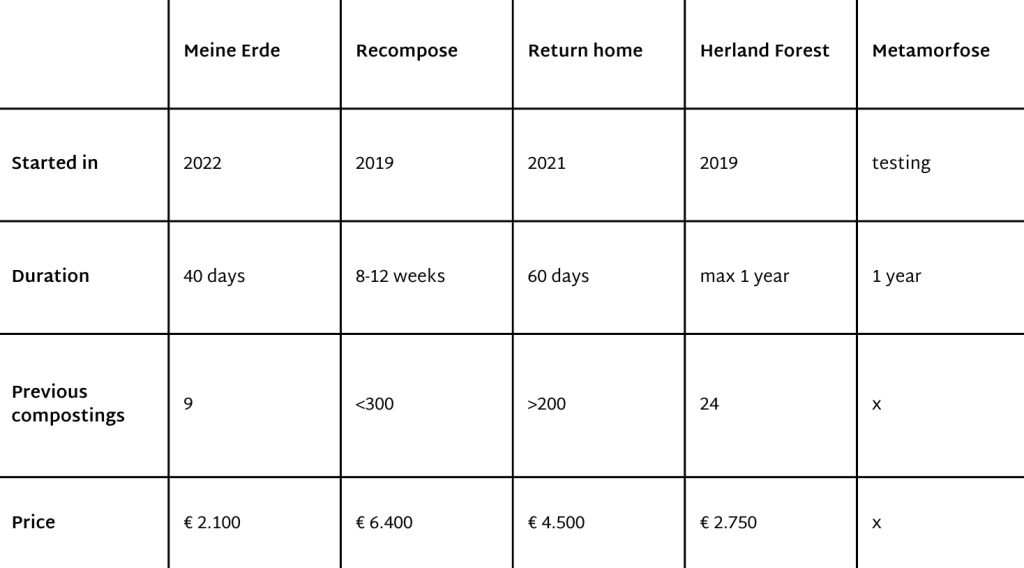
When looking at our German neighbors, it is possible that composting may become the most affordable funeral method in the future. Alongside the sustainability arguments and the concept of becoming a part of nature, we are eagerly anticipating the arrival of composting.

